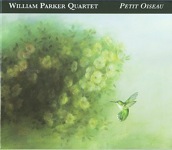Home » Jazz Articles » Album Review » William Parker: Petit Oiseau
William Parker: Petit Oiseau
The quartet that creates the music on Petit Oiseau is close knit. They are as brothers. Their tightness sets a standard and molds their sound. They can move within and outside of their unity without ever sacrificing it. As individual instrumentalists, each can rely on another to be responsive to any specific phrasings without being tangential, ensuring the group's integrity.
Altoist Rob Brown and trumpeter Lewis Barnes take on lead roles in the quartet. The conversations they have with each other often meld into harmonic dissertations which themselves, once established, can shoot off in different directions, sometimes dissonant, sometimes curvilinear ("Groove Sweet"), wild and bright ("Four for Tommy"), or a combination of every dynamic and timbre ("Shorter For Alan"); the two always come back to center. Brown and Barnes complement each other tonally and figuratively ("The Golden Bell"). The instrumental fluid blending and exchange of lines between them is downright friendly ("Malachi's Mom") and occasionally assiduously serious ("Shorter for Alan").
The center of the music is rooted both in William Parker's clear-cut, recurrent, imitative, unabashed and extraordinarily simple bass line statements which can rise into mindful, introverted solo explorations ("Shorter for Alan"), and also in Hamid Drake's direct and unwavering polyrhythmic flurries, flashes, collective clicks on the cymbals and resilient strokes across the toms. Parker and Drake are without doubt different arms to one body. There is nothing that they do that is disconnected ("Talaps Theme," "Malachi's Mom").
The title tune exemplifies the height of this group's capacity to roll out a theme/improvisation in which absolutely no holes exist. Every musical idea is complete. Nothing is lacking. Synchronistic coordination between the alto and the trumpet, supported by stalwart rhythmic flexibility, separates into logically intuitive improvisation from either horn; one horn line can intercept the line of the other, but not without being thoroughly developed first. The inserted coloration of the bass and cymbals and rapid stick work on the toms and snare supplies a satisfying change in sonic texture.
Being human requires practicing being human. That does not mean sinking inescapably into the human state; rather it means moving with and through living, and for Parker and the musicians he works with, the medium for that travel is music ("Dust From A Mountain"). And if this medium conveys the human character, Parker and his musicians are happy because they are stepping into the space beyond suffering and expressing their will for compassion and wisdom.
Track Listing
Groove Sweet: Groove #7/Hamid's Groove/Daughters Joy; Talaps Theme; Petit Oiseau; The Golden Bell; Four For Tommy; Malachi's Mode; Dust From A Mountain; Shorter For Alan.
Personnel
William Parker
bassWilliam Parker: bass and cedar flute; Lewis Barnes: trumpet; Rob Brown: alto saxophone and B-flat clarinet; Hamid Drake: drums, balafon and frame drum.
Album information
Title: Petit Oiseau | Year Released: 2008 | Record Label: AUM Fidelity
< Previous
The Standard
Next >
GRACEfulLEE
Comments
Tags
For the Love of Jazz
 All About Jazz has been a pillar of jazz since 1995, championing it as an art form and, more importantly, supporting the musicians who create it. Our enduring commitment has made "AAJ" one of the most culturally important websites of its kind, read by hundreds of thousands of fans, musicians and industry figures every month.
All About Jazz has been a pillar of jazz since 1995, championing it as an art form and, more importantly, supporting the musicians who create it. Our enduring commitment has made "AAJ" one of the most culturally important websites of its kind, read by hundreds of thousands of fans, musicians and industry figures every month.




















